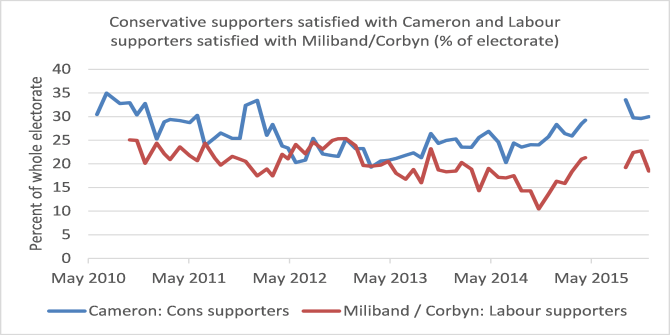 The social divide among Leavers and Remainers is striking. The immediate reaction of many to run a second referendum therefore fails to understand the cause of the result: many feel that they have no influence over the immediate circumstances that surround them. But it’s not just the electorate’s 48 per cent who need to understand these drivers, writes Tony Hockley, but UK and EU elites alike: it is time to start thinking about the reforms that will address this widespread division and discontent.
The social divide among Leavers and Remainers is striking. The immediate reaction of many to run a second referendum therefore fails to understand the cause of the result: many feel that they have no influence over the immediate circumstances that surround them. But it’s not just the electorate’s 48 per cent who need to understand these drivers, writes Tony Hockley, but UK and EU elites alike: it is time to start thinking about the reforms that will address this widespread division and discontent.
Many of those who now complain about the referendum result personally know no-one who voted for Brexit. Think about this for a moment and the result begins to make sense. Think about it for a little longer and the idea of signing a petition for another vote becomes the worst loser response, not the best. Social group AB voted to remain. The remainder of the country did not. Put in more crude terms, those with money – of all ages – voted Remain, those without voted Leave. Calls for another referendum, a general election, or for Parliament to reject the result will rightly be seen as another attempt by privileged groups to assert their authority over the rest.
A decent job and relative affluence provide autonomy; at work, at home, and above all over the social circle that is inhabited. Within every area that voted to leave the EU there will still be shocked, isolated groups of ABs who see only the benefits of unfettered free movement in Europe, and worry about economic growth. For others the shock is from how much the identity of their community has changed, how quickly, how little they have gained from this, and how little influence they have had. They feel stripped of autonomy.
Since 2010, the government has pursued policies to devolve control to individuals and communities. Directly-elected mayors and police and crime commissioners, and the ability to create new “free schools” are all attempts to foster local engagement in decisions that affect daily life. In January 2016, David Cameron announced a new strategy to regenerate run-down council estates, concerned that those who could move out had done so, leaving behind those unable to do so. The crumbling buildings of the estates of the 1960s can and will be improved. But the established social identity of many communities has also been crumbling, with no strategy for its replacement. Social identities matter. Humans are herd animals and social identity determines a large part of individual behaviour. It can be a force for good, binding communities together in social engagement, or a force for division when a community feels threatened.
I recently revisited the council estate of my 1970s childhood in Southampton. Until I walked down my old high street I had not understood the rising discontent about migration. Whilst the benefits of free movement are spread wide, the costs tend to be very concentrated. Population data for my old council ward shows that in the decade to 2011 there was an unprecedented influx of almost 2000 new residents who had been born overseas, about half of these came from Poland. This will have affected local homes, schools, shops, and jobs.
Even ward-level data on migration hides the full-scale of the localised and rapid change that has taken place. Good or bad it is an external force over which no-one in Britain has any influence. It is human nature to attach greater value to what is already possessed rather than what might be gained from change, known as the “endowment effect”. It is also human nature to prefer self-determination over control. That is why so many were motivated to vote for Brexit. These issues are not unique to one ward in Southampton, which is by no means an extreme case, but are being felt across the EU. It is clear that a referendum in any other member state could produce a similar response.
The European “project” was designed within a world of sparring blocs of developed countries. These countries were the source of world economic growth and social advance. Since then there has been the collapse of the Eastern Bloc, trade globalisation and fragmentation, and the single currency experiment. Excess confidence in the European project is based on an assessment of the past, and not of the future. The whole concept of a federal European bloc is looking dated and dangerous. It is too distant, and too inflexible. As the referendum has shown, handouts from the EU budget to deprived communities are no compensation for the loss of control. The message of the Leave campaign to “Take back Control” proved to be particularly salient amongst affected communities. Those who have control over their own lives – because they have money – just cannot comprehend the problem.
Leave voters were not ignoring the experts. They were not stupid and misled. To claim that they were simply reinforces the underlying prejudices. Polls the weekend after the vote showed little remorse over voting decisions. They understood as well as anyone that the claims on both sides were more rhetoric than fact. They understood that change is a risk, but they also believed that they had little to lose. The experts, however, were not listening to them, and were too quick to denounce anyone who challenged their consensus. For the most part the experts are still not listening, and still denouncing.
The period between the UK referendum and the beginning of any formal negotiation on Britain’s European future provides a valuable opportunity for reflection and reform. Political leaders in the EU and the UK must think carefully about the substantive reforms that will be needed to address widespread social division and discontent. As long as people feel that they have no influence over the immediate circumstances within which they live, then divisions will become ever more entrenched and inflammatory. If more people feel in control of their lives then the problems within the UK and Europe can start to be tackled.
____
 Tony Hockley is Director of the Policy Analysis Centre. He was previously a Special Adviser to Cabinet ministers in the Conservative Government led by John Major, Adviser to Dr David Owen as Leader of the Social Democratic Party, and Head of Research at the Social Market Foundation. He has also worked in industry on public policy in London, Washington and Brussels. Since 2001 he has taught in the LSE Department of Social Policy, most recently in Behavioural Public Policy.
Tony Hockley is Director of the Policy Analysis Centre. He was previously a Special Adviser to Cabinet ministers in the Conservative Government led by John Major, Adviser to Dr David Owen as Leader of the Social Democratic Party, and Head of Research at the Social Market Foundation. He has also worked in industry on public policy in London, Washington and Brussels. Since 2001 he has taught in the LSE Department of Social Policy, most recently in Behavioural Public Policy.









Yet again this seems to be a case of blaming the wrong people. The issue is one of deprivation and social and economic division. Immigration is just a convenient scapegoat for the much deeper and more complex problems with our society. Problems that OUR government has failed to address, not the EU and only our government has ever had the power to address. This whole exercise seems to be one of displaced anger. Free movement of people is not the problem, the EU is not the problem. The problem is and always has been with the governments we elect.
Immigration is just a highly visible multiplier of the social and economic structural issues with our society. Even if we could remove it (and we can’t) the underling problems would still exist.
I’d commend the Lord Ashcroft polls to you and the work by IPSOS-MORI, to better understand the motives of the huge number of people who turned out to vote Leave. There is also a very good blog piece posted this week on why people voted. My perception is that the most stable parts of the population of England (who travel least and move home least, whether by necessity or desire) are most susceptible to changes over which they have little say or control. I’ve also written a subsequent piece as more data emerge on issues relating to social identities and the challenges they face.
While agreeing with much that is in the article, I think the assessment is incomplete.
I live in an affluent village in the South and do know a number of educated and intelligent people who voted to leave. They were older voters with a firm sense of nationhoiod and a horror of any of the present migrants/refugees upsetting the apple cart. The EU (not really us) was perceived as handling the crisis badly.
Ian. I hope I’ve better addressed the issue you raise in my subsequent blog on this, on “social identity”. Some really good data are emerging on the views of Leave voters, courtesy of Lord Ashcroft’s polling and IPSOS-MORI in particular. It is now possible to spot some common concerns across very different parts of the population.
Many thanks for the thoughtful comments. It is clear that the referendum vote has put local social issues on the public policy agenda: I’ve noted that candidates to be David Cameron’s successor are raising questions around social identity and community cohesion. As you state, addressing this will be much harder in the absence of economic growth.
A Post-liberal Brexit Future.
http://quarterly.demos.co.uk/article/issue-1/a-postliberal-future/
In the ongoing battle to capture Cosmopolitanism that is currently raging between the political, economic and cultural liberal elites and the communitarian ethics of the common person, the eu debate was an attempt by the elites to take Britain into deeper economic and social liberalism.
Thankfully, the communitarian ethics of the common person won by a very narrow margin which goes to show that community is just as important as the individual if not slightly more so.
This means that positive rights and the responsibilities that naturally follow are seen as slightly more important, and so as necessary, as the negative rights that tend to be more emphasised by the eu and its incumbent elites.
Thus, Transition Brexit and the much needed reform of British political, economic and social policy systems needs a post-liberal consensus in which a mutual compact between the market, the state and civil society ensures prosperity and fairness for all.
Foremost, this will require a Bill of Rights and Responsibilities to reflect an equal measure of both communitarian and liberal values and one which might pioneer the basis of a new Cosmopolitanism.
In terms of policy, again an equal measure of communitarian and liberal values will need to be incorporated but with an emphasis on ensuring that democracy enables communities to make up their own mind about the mix of values that they wish their communities to be based on.
By bringing forth the outcome of the eu referendum, then one hopes that all political parties will work together with businesses small and large and with civil society to ensure a Brexit settlement and a reformed Britain that gives all citizens, whatever their ethnic origins, a fair share of our commonwealth.
I hope that one of the legacies of this referendum is that articles like this can be published now without being smeared as closet racism.
I believe that the metro liberals have been guilty of their own crimes against the struggling natives, not a hate crime, more deliberate blind ignorance and distain. The nation has not changed as a result of the referendum, the change is that we now have data that exposes the divide. Hopefully we will develop a mind set that the native disadvantaged are worthy of help, rather than work-shy, economically-illiterate, closet-racists.
The article is spot on. There is need for reflection, the response from Politicians on the Remain said he shown lack of understanding of the underlying problems. They are out of touch and you can feel this listening to former Prime Minister Tony Blair. Does not accept why he was voted out, the very reason people have voted to leave. The problem is about lack of opportunities for the poor and marginalization.
‘those with money – of all ages – voted Remain, those without voted Leave. That is incredibly simplistic with nothing offered to back it up. Liverpool and Leicester – two cities with high levels of deprivation – voted Remain. Large swathes of the wealthier rural England voted Leave. I’m really getting a bit worn by this ‘disenchanted poorer Labour voters voted Leave’ tack, whilst ignoring the wealthier middle classes who voted Leave. And yes, I do know people who I both know and suspect voted Leave, including in my family – not wealthy but both middle and working class folk.
The analysis is spot on but there are 2 issues to be dealt with and they have different timescales. Yes we must address social inclusion. We have to share the benefits of growth. We have to push out from London the decision making process. We tried all that in the Blair years. And it is hard and slow. But necessary. But the referendum came to the wrong conclusion for the wrong reasons and implementation will put further obstacles in the way of the wider agenda because austerity is a bad basis for social development. We have weeks to do something about that.
Unless there is a General Election where people vote for a specific exit plan, any Prime Minister who triggers Article 50 will never be forgiven.
I hope (slim hope) the answer lies in
1 A ‘Brexit divide’ Political realignment, even if just on a temporary basis
2 A General Election with one Brexit candidate opposed by one Remain candidate in each constituency.
If Brexit is to go ahead, we need a House with a natural Brexit majority.
Or it would be one last chance for the country to pull back.
I can see only two difficult options. An informal, evolving into a formal, negotiation prior to triggering article 50 which could lead to a second referendum. Or the same leading to the justification of a Parliamentary rejection of the first referendum
Yes, denial still looms about the social mobility divide in the UK. Even politicians like David Lammy should be made to reconsider his position, it could be suggested.
Where was the social mobility policies, the reinvention of productive lives and rebuilding of confidence to the British people? There was seemingly a loss of connection by British politicians to FIGHT for this. Instead, there was a continuous political plan to be reliant on immigration to fill roles, and NOT an Inspirational goal to CHAMPION the rebuilding of REAL British lives.
Hence, a bloody nose was given.
Wasn’t this inevitable – given the local and national political party NEGLECT of British people whose VOICES were continually put into deeper and deeper waters… and silenced for far too long?
Amid the political and policy failings, challenges that result and the ASPIRATIONS that are desperately sought by GREAT BRITAIN’S, why shouldn’t there be a CHAMPION amongst the political class who FIGHTS for such courageous people?